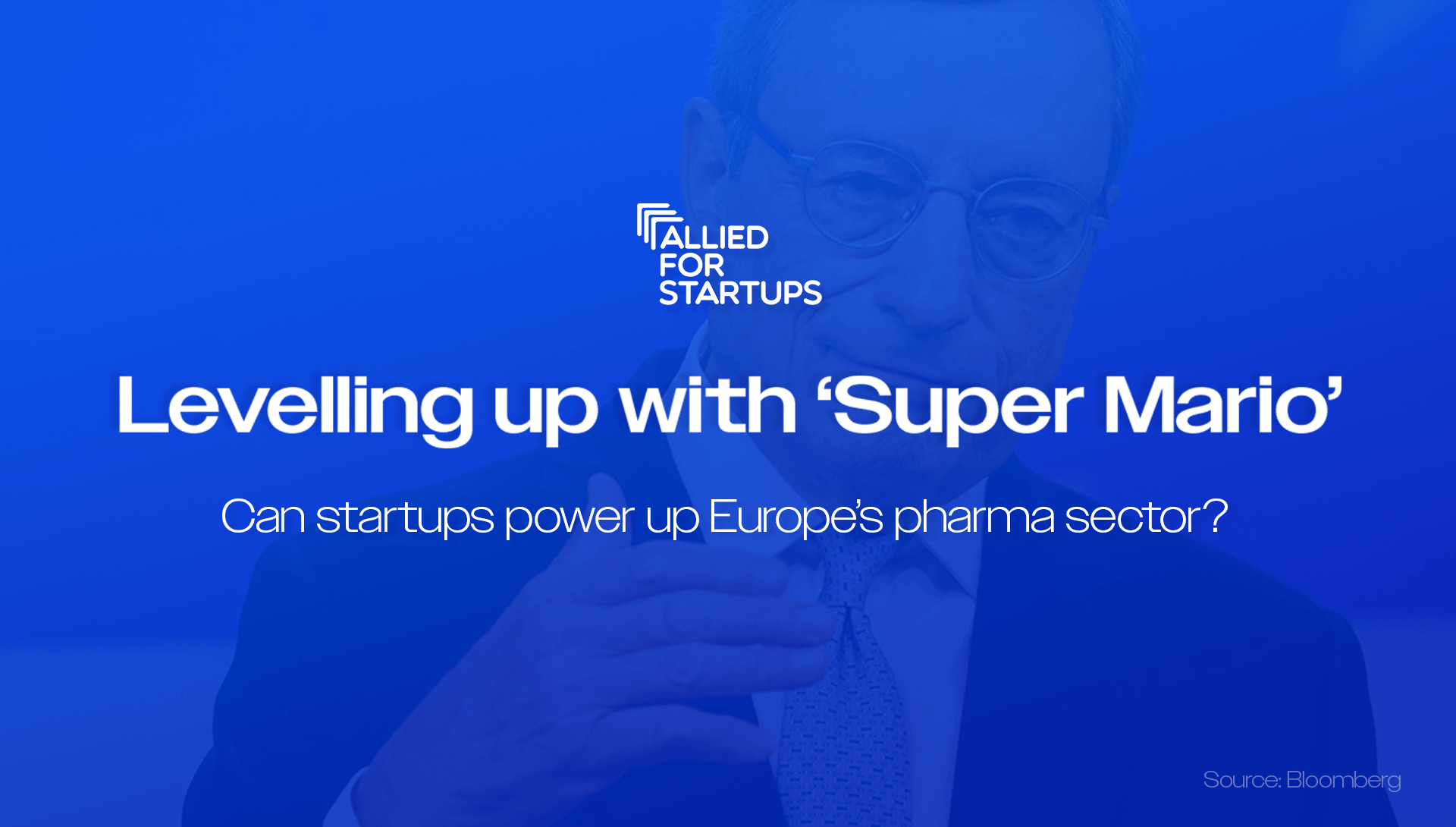Levelling up with ‘Super Mario’: Can startups power up Europe’s pharma sector?
Last week, Mario Draghi, former PM of Italy and head of the ECB, released his report on the future of Europe’s competitiveness. Health, one of the priorities of the new EU mandate, is struggling to keep up, with the pharmaceutical industry in particular falling behind global competitors. As the world’s fourth largest industry, the pharmaceutical sector should be Europe’s powerhouse – and digital health startups are the key to achieving this. Let’s take a closer look at what the Draghi Report recommends.
Stage 1: Entering the Innovation Pipeline
The Draghi report provides some key takeaways to assess the current investment in health research in Europe. While the U.S. invested €44 billion in 2022, the EU spent €11.2 billion. Correspondingly, 0.11% of the EU GDP was directed towards pharma R&D, compared to 0.45% in the U.S. These statistics highlight a fundamental issue: Europe is not investing enough in the future of pharmaceuticals, particularly in advanced therapies and biotech.
To succeed in this competitive landscape, Draghi recommends several key strategies for success:
- Leveraging the European Health Data Space (EHDS): The EHDS is set to transform how health data is shared and used, speeding up regulatory processes. To unlock its full potential, the EU must ensure access to national health data bodies and resources to meet new EU standards and requirements for electronic health records. Streamlining access to these resources will help accelerate digital health innovation.
- Establishing clear rules for multi-country trials: Coordinating mechanisms between national ethics committees and EU-level decision-makers is crucial for running trials across borders. Additionally, the integration of medical devices with the application of AI in trials needs well-defined regulations for smooth collaboration.
- Simplifying regulatory frameworks between national medicine agencies and other relevant national actors: Navigating 27 EU regulatory frameworks is complex as it is, particularly for startups. However, streamlining these processes into one model, a plan of the Health Technology Assessment (HTA), will accelerate drug development and market access.
- Increasing the focus on public investment in R&D: Establishing EU innovation hubs, particularly in advanced therapies, is essential to push for innovative solutions and for Europe to remain competitive in the global healthcare landscape. Increasing the European Investment Fund (EIF) budget and scaling up investments in startups and SMEs will drive these breakthroughs forward.
Stage 2: It’s Time to Level Up
For digital health startups, Draghi’s recommendations offer a roadmap for success. By aligning their innovations with the EU’s policy priorities – such as the EHDS, Health Technology Assessment (HTA), and the upcoming Pharma Package – they can play a crucial role in shaping the future of healthcare.
Although securing funding remains a challenge, the EU’s Horizon Programme offers significant support for startups, and now it is time to make the most of it. There is a need for more cooperative efforts between startups, larger pharma companies, academia, and healthcare providers. If stakeholders work together, the EU can overcome the challenges that are holding it back.
Startups are also well-positioned to utilise the power of AI to transform patient outcomes through personalised care, reduce costs, and speed up drug discovery. In a healthcare ecosystem that is continuously driven by data, this is a golden opportunity for startups to offer new solutions.
Stage 3: Startups, Press Start for Success
As discussed by many health experts, including MEP Tilly Metz (currently the European Parliament’s Public Health subcommittee’s vice-chair), the EU already has a robust healthcare system and the research capabilities to achieve this. Now, it’s time to maximise these resources for greater impact.
If there’s one clear message from the Draghi Report, it’s that Europe’s pharma sector needs a jolt of innovation. At Allied for Startups, we advocate that digital health startups can help achieve this transformation, with a forte in data-driven solutions. For this potential to be realised, the EU must create a support system to accelerate clinical research, harness real-world data, and apply AI for personalised treatment and medicines. We believe that, with the right allocation of resources, partnerships and support, particularly in the approaching policy priorities, startups will be the driving force of pharmaceutical innovation!

